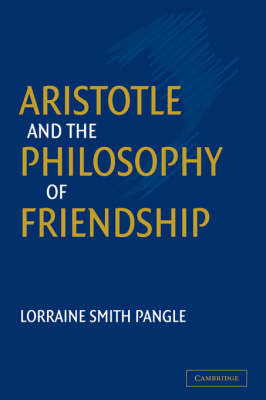
Aristotle and the Philosophy of Friendship
Seiten
2002
Cambridge University Press (Verlag)
978-0-521-81745-5 (ISBN)
Cambridge University Press (Verlag)
978-0-521-81745-5 (ISBN)
This book offers a comprehensive account of the major philosophical works on friendship. The book gives central place to Aristotle's examination of friendship in the Nicomachean Ethics. Clearly structured and engagingly written, it will appeal to readers across philosophy, classics and political science.
This book offers a comprehensive account of the major philosophical works on friendship and its relationship to self-love. The book gives central place to Aristotle's searching examination of friendship in the Nicomachean Ethics. Lorraine Pangle argues that the difficulties surrounding this discussion are soon dispelled once one understands the purpose of the Ethics as both a source of practical guidance for life and a profound, theoretical investigation into human nature. The book also provides fresh interpretations of works on friendship by Plato, Cicero, Epicurus, Seneca, Montaigne and Bacon. The author shows how each of these thinkers sheds light on central questions of moral philosophy: is human sociability rooted in neediness or strength? is the best life chiefly solitary, or dedicated to a community with others? Clearly structured and engagingly written, this book will appeal to a broad swathe of readers across philosophy, classics and political science.
This book offers a comprehensive account of the major philosophical works on friendship and its relationship to self-love. The book gives central place to Aristotle's searching examination of friendship in the Nicomachean Ethics. Lorraine Pangle argues that the difficulties surrounding this discussion are soon dispelled once one understands the purpose of the Ethics as both a source of practical guidance for life and a profound, theoretical investigation into human nature. The book also provides fresh interpretations of works on friendship by Plato, Cicero, Epicurus, Seneca, Montaigne and Bacon. The author shows how each of these thinkers sheds light on central questions of moral philosophy: is human sociability rooted in neediness or strength? is the best life chiefly solitary, or dedicated to a community with others? Clearly structured and engagingly written, this book will appeal to a broad swathe of readers across philosophy, classics and political science.
Acknowledgements; Introduction; 1. The challenge of Plato's Lysis; 2. The three kinds of friendship; 3. Aristotle and Montaigne on friendship as the greatest good; 4. Friendships in politics and the family; 5. Cicero's Laelius: political friendship at its best; 6. Quarrels, conflicting claims and dissolutions; 7. Friends as other selves; 8. Goodwill, concord, and the love of benefactors; 9. Self-love and noble sacrifice; 10. Friendship in the happy life; Notes; Bibliography of modern works and editions; Index of names.
| Erscheint lt. Verlag | 14.11.2002 |
|---|---|
| Verlagsort | Cambridge |
| Sprache | englisch |
| Maße | 160 x 236 mm |
| Gewicht | 497 g |
| Themenwelt | Geisteswissenschaften ► Philosophie ► Ethik |
| Geisteswissenschaften ► Philosophie ► Philosophie Altertum / Antike | |
| Sozialwissenschaften ► Politik / Verwaltung ► Politische Theorie | |
| ISBN-10 | 0-521-81745-5 / 0521817455 |
| ISBN-13 | 978-0-521-81745-5 / 9780521817455 |
| Zustand | Neuware |
| Informationen gemäß Produktsicherheitsverordnung (GPSR) | |
| Haben Sie eine Frage zum Produkt? |
Mehr entdecken
aus dem Bereich
aus dem Bereich


